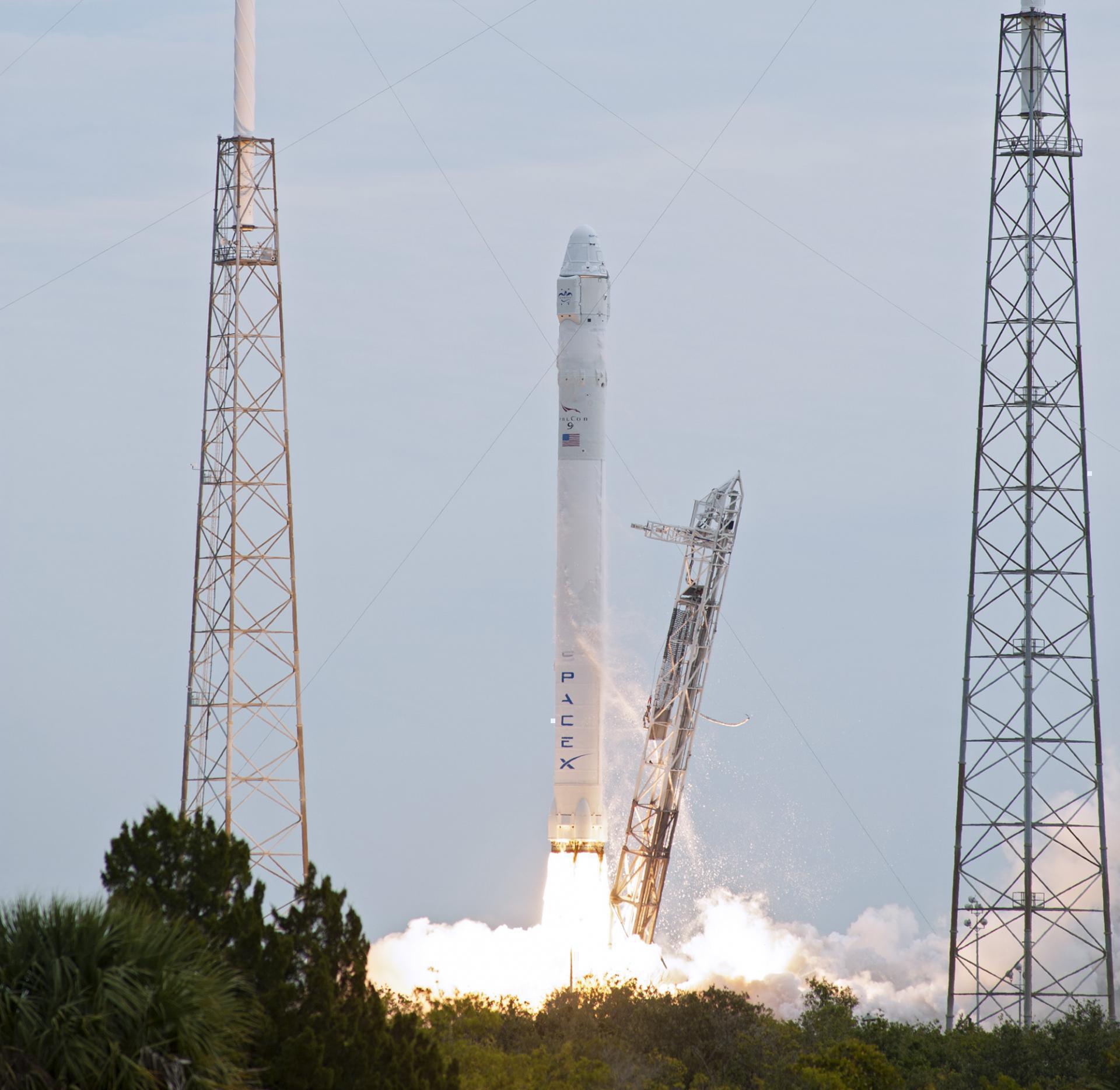
Falcon 9
In-activeSpaceX (SpX)
June 4, 2010
Description
The Falcon 9 v1.0 first stage was used on the first five Falcon 9 launches, and powered by nine SpaceX Merlin 1C rocket engines arranged in a 3x3 pattern.
Specifications
-
Stages
2 -
Length
47.8 m -
Diameter
3.65 m -
Fairing Diameter
― -
Launch Mass
318.0 T -
Thrust
3807.0 kN -
Apogee (Sub-Orbital)
200.0 km
Family
-
Name
Falcon 9 -
Family
― -
Variant
v1.0 -
Alias
― -
Full Name
Falcon 9 v1.0
Payload Capacity
-
Launch Cost
$59000000 -
Low Earth Orbit
9300.0 kg -
Geostationary Transfer
Orbit
3400.0 kg -
Direct Geostationary
― -
Sun-Synchronous Capacity
―
SpaceX
Commercial
CEO: Elon Musk
SpX 2002Space Exploration Technologies Corp., known as SpaceX, is an American aerospace manufacturer and space transport services company headquartered in Hawthorne, California. It was founded in 2002 by entrepreneur Elon Musk with the goal of reducing space transportation costs and enabling the colonization of Mars. SpaceX operates from many pads, on the East Coast of the US they operate from SLC-40 at Cape Canaveral Space Force Station and historic LC-39A at Kennedy Space Center. They also operate from SLC-4E at Vandenberg Space Force Base, California, usually for polar launches. Another launch site is being developed at Boca Chica, Texas.
Falcon 9 v1.0 | SpX CRS-2
SpaceX | United States of AmericaCape Canaveral SFS, FL, USA
March 1, 2013, 3:10 p.m.
Status: Launch Successful
Mission:
This was the fourth flight for SpaceX's uncrewed Dragon cargo spacecraft, the fifth and final flight for the company's two-stage Falcon 9 v1.0 launch vehicle, and the second SpaceX operational mission contracted to NASA under a Commercial Resupply Services contract. The launch occurred on March 1, 2013. A minor technical issue on the Dragon spacecraft involving the RCS thruster pods occurred upon reaching orbit, but it was recoverable. The vehicle was released, splashed down, and recovered by SpaceX.
Low Earth Orbit B0007 - Maiden Flight Atlantic OceanFalcon 9 v1.0 | SpX CRS-1
SpaceX | United States of AmericaCape Canaveral SFS, FL, USA
Oct. 8, 2012, 12:35 a.m.
Status: Launch was a Partial Failure
Mission:
This was the third flight for the uncrewed Dragon cargo spacecaft and the first SpaceX mission under their Commercial Resupply Services contract with NASA. Dragon delivered various cargo to the staion, and returned after being berthed to the station for 17 days. The spacecraft landed in the Pacific Ocean and was recovered by SpaceX.
Low Earth Orbit B0006 - Maiden Flight Atlantic OceanFalcon 9 v1.0 | SpaceX COTS Demo Flight 2
SpaceX | United States of AmericaCape Canaveral SFS, FL, USA
May 22, 2012, 7:44 a.m.
Status: Launch Successful
Mission:
SpaceX COTS Demo Flight 2 (COTS 2), was the second test-flight for SpaceX's uncrewed Dragon cargo spacecraft, launched on the third flight of the company's two-stage Falcon 9 launch vehicle. The flight was performed under a funded agreement from NASA as the second Dragon demonstration mission in the Commercial Orbital Transportation Services (COTS) program. The purpose of the COTS program is to develop and demonstrate commercial sources for cargo re-supply of the International Space Station (ISS). The Dragon C2+ spacecraft was the first American vehicle to visit the ISS since the end of the Space Shuttle program. It was also the first commercial spacecraft to rendezvous and berth with another spacecraft.
Low Earth Orbit B0005 - Maiden Flight Atlantic OceanFalcon 9 v1.0 | SpaceX COTS Demo Flight 1
SpaceX | United States of AmericaCape Canaveral SFS, FL, USA
Dec. 8, 2010, 3:43 p.m.
Status: Launch Successful
Mission:
SpaceX COTS Demo Flight 1 in 2010 was the unmanned first spaceflight of the SpaceX Dragon spacecraft, the Dragon C1, which orbited the Earth, and the second overall flight of the SpaceX Falcon 9. It was also the first demonstration flight for NASA's Commercial Orbital Transportation Services (COTS) program for which SpaceX was selected. The primary mission objectives were to test the orbital maneuvering and reentry of the Dragon capsule.
Low Earth Orbit B0004 - Maiden Flight Atlantic OceanFalcon 9 v1.0 | Dragon Spacecraft Qualification Unit (DSQU)
SpaceX | United States of AmericaCape Canaveral SFS, FL, USA
June 4, 2010, 6:45 p.m.
Status: Launch Successful
Mission:
The Dragon Spacecraft Qualification Unit was a boilerplate version of the Dragon spacecraft. After using it for ground tests to rate Dragon's shape and mass in various tests, SpaceX launched it into low Earth orbit on the maiden flight of the Falcon 9 rocket. SpaceX used the launch to evaluate the aerodynamic conditions on the spacecraft and performance of the carrier rocket in a real-world launch scenario, ahead of Dragon flights for NASA under the Commercial Orbital Transportation Services program.
Low Earth Orbit B0003 - Maiden Flight Atlantic OceanFalcon 9
Starlink Group 6-104
Space Launch Complex 40 - Cape Canaveral SFS, FL, USAA batch of 28 satellites for the Starlink mega-constellation - SpaceX's project for space-based Internet communication system.
Falcon 9
Starlink Group 17-25
Space Launch Complex 4E - Vandenberg SFB, CA, USAA batch of 25 satellites for the Starlink mega-constellation - SpaceX's project for space-based Internet communication system.
Falcon 9
Starlink Group 10-36
Space Launch Complex 40 - Cape Canaveral SFS, FL, USAA batch of 29 satellites for the Starlink mega-constellation - SpaceX's project for space-based Internet communication system. First Starlink laun…
Falcon 9
Starlink Group 6-103
Space Launch Complex 40 - Cape Canaveral SFS, FL, USAA batch of 29 satellites for the Starlink mega-constellation - SpaceX's project for space-based Internet communication system.
Falcon 9
Starlink Group 17-13
Space Launch Complex 4E - Vandenberg SFB, CA, USAA batch of 24 satellites for the Starlink mega-constellation - SpaceX's project for space-based Internet communication system.

